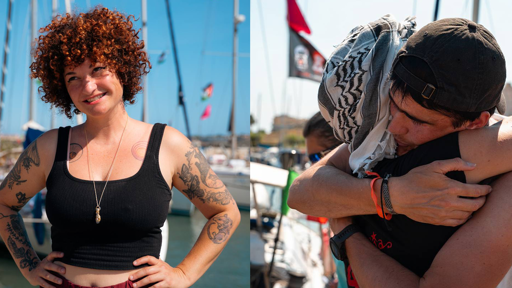“When the world stays silent, we set sail.”
The Global Sumud Flotilla, an international, grassroots fleet of nearly 50 vessels, is on its way to Palestine. Participants from different countries, speaking different languages find harmony in one goal: breaking Israel’s illegal siege on Gaza. Though two ships were attacked in Tunisian waters, the voyagers are undeterred in their goal and expect to reach Gaza in the coming days.
The Global Sumud Flotilla is not the first attempt at breaking Israel’s blockade by sea. The Handala expedition, which set sail in July 2025 was the 37th trip since the early 2000s. After the boats “Liberty” and “Free Gaza” successfully broke the siege in 2008, only five out of 31 ships could do the same in the next eight years.
Huwaida Arraf was on board one of the ships in 2008 as well as the Handala in 2025. She gave a keynote address at this summer‘s Peoples Conference For Palestine.
“Inaction is unacceptable and silence is complicity,” she said. “What does it mean for Gaza to be the compass that guides us…? It means listening to the voices of Palestinians, listening to voices of those living under apartheid trying to survive a genocide and refusing to accept the lie that nothing can be done.”
Singer-songwriter Carsie Blanton who is sailing with the Global Sumud Flotilla employs music to raise the morale of her crew mates. As an Artist Against Apartheid she notes that her musical practice and political organizing are parts of a harmonious whole. In her nearly ten years of making protest music – and the two most recent ones in the Palestine movement – she’s learned that “singing together is the original collective action.”
“The flotilla is not only powerful as a political demonstration, but beautiful,” she said. “It is a great swell of love and solidarity, which is also what art is made of…The sounds on a sailboat are beautiful! Water, wind, and many languages. On my boat we have people speaking Italian, Spanish, Turkish, Malay, and English.”
Blanton told me that she also finds beauty in the variety of working people aboard the ships and their orchestra of resistance traditions. From teachers and engineers to psychologists and aid workers, she expressed admiration in their ability to raise their voices in a cry against genocide. She showed this in a recent instagram reel where she asked crewmates to sing their cultural liberation songs, these included the Swedish “Leve Palestina, Krossa Sionismen” the Irish “Come Out, Ye Black and Tans,” an Azan from the Quran and Italian poet Giuliano Logos’s rendition of “Brigante se More.”
Fellow Artist Against Apartheid, Leila Hegazy, has also shared videos of herself singing while aboard the flotilla.
“On we sail,” she sang. “May humanity prevail, may the occupation fail, and then inshallah, we’ll break the siege, and we’ll end complicity in the suffering of Falastin. May Palestine be blessed and free.”
The Egyptian-Italian singer was in Tunis when a drone seemingly dropped an incendiary grenade onboard “Alma” late on September 9. This came less than 24 hours after a similar attack on the “Family,” no one was seriously injured and both ships are currently en route to Gaza. Such persistence not only characterizes the mass movement for Palestine, but its music.
“It’s a major sacrifice that she has made and I’m very proud of her for it,” said her twin Omnia Hegazy. “It’s not a luxurious life being on the boat…of course it’s nothing compared to what the people in Gaza are going through.”
While Omnia’s music has echoed radical themes since Egypt’s 2011 revolution, her folk-inspired style did not overlap with her sister’s R&B style until the 2016 election of Donald Trump prompted them to collaborate on a project about surviving capitalism. Today, they are inspired by songs like Cairokee’s “Ya El Medan.”
Both members of the Hagazy Band balance lives of performing, organizing, and music instruction. Though they are still navigating the overlap, they feel that each involves raising consciousness. To Omnia, not only does a visible platform contribute to safety, but it helps fans hear about new strategies, events, and emergencies.
“As artists we are also teachers,” she said. “I think a lot of our fans learn when we take part in these struggles, and feel uplifted by those struggles…The siege will be broken, whether on this flotilla or another one, the people will break the siege.”
The world is listening in as the Global Sumud Flotilla heads towards Gaza. 16 nations, including South Africa, Brazil, Colombia, and Mexico have pledged to hold any attacks on the fleet accountable. Those aboard the ships have continued to amplify the voice of Palestinians; on September 17 they boosted a post saying that “Gaza is in total Blackout” and that “‘Israel’ has increased its massacres in silence.” Similarly, people around the world are being called to “Sound the Alarm against Israel’s ‘Final Solution’” in a global week of action.
The tempo of the movement is picking up pace, its volume rising with the tides. Musicians have taught us what resistance sounds like. We know its rhythms; the waves will not drown them out. We listen in deafening silence awaiting the death knell of genocide. Whatever comes next will echo around the world.
The post Sailing to break the siege, singing to break the silence appeared first on Peoples Dispatch.
From Peoples Dispatch via this RSS feed


